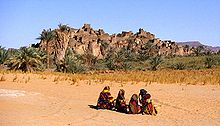Djado Plateau

The Djado Plateau lies in the Sahara, in northeastern Niger. It is known for its cave art (often of large mammals long since absent from the area), but is now largely uninhabited, with abandoned towns and forts still standing and visible. As of 2011, the commune of Djado had a total population of 1,495 people.[1]
World Heritage Status[]
This site was added to the UNESCO World Heritage Tentative List on May 26, 2006, in the Cultural category due to its universal cultural significance.
Djado City[]
The ruined city and ksar of Djado lies on the southern end of the plateau at 450 metres (1,500 ft) of elevation within a small oasis of brackish water. Long ago abandoned by the Kanuri people, who may or may not have been its original founders, the date palms of the area are now[when?] tended by Toubou nomads.[2]
References[]
- ^ "Annuaires_Statistiques" (PDF). Institut National de la Statistique du Niger. Retrieved 2 May 2013.
- ^ "Old Djado Ruins of Niger". Retrieved 27 June 2017.
External links[]
Coordinates: 20°58′59″N 12°19′59″E / 20.983°N 12.333°E
- Plateaus of Africa
- Landforms of Niger
- Tuareg
- Communes of Niger
- Former populated places in Niger
- Sahara
- Niger geography stubs
